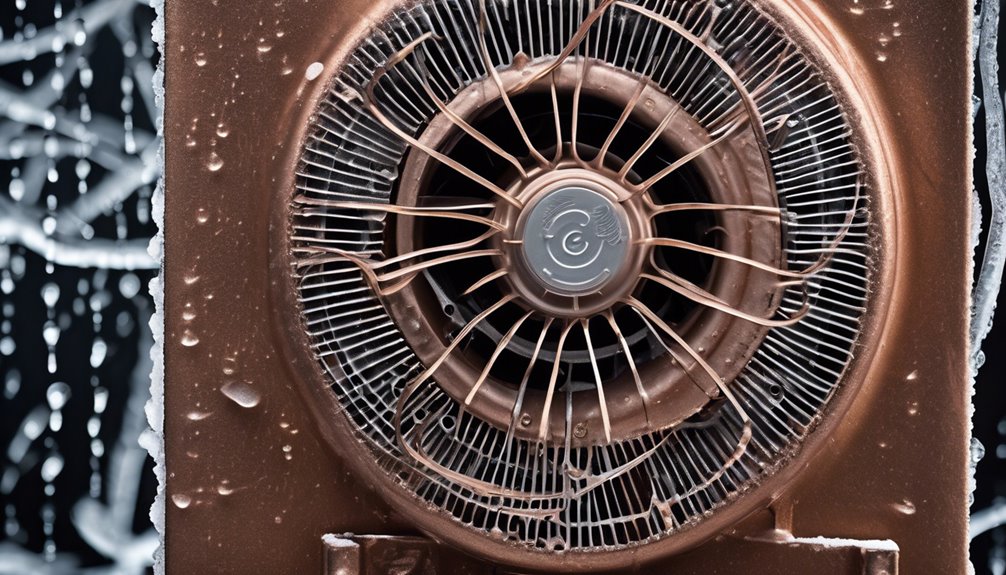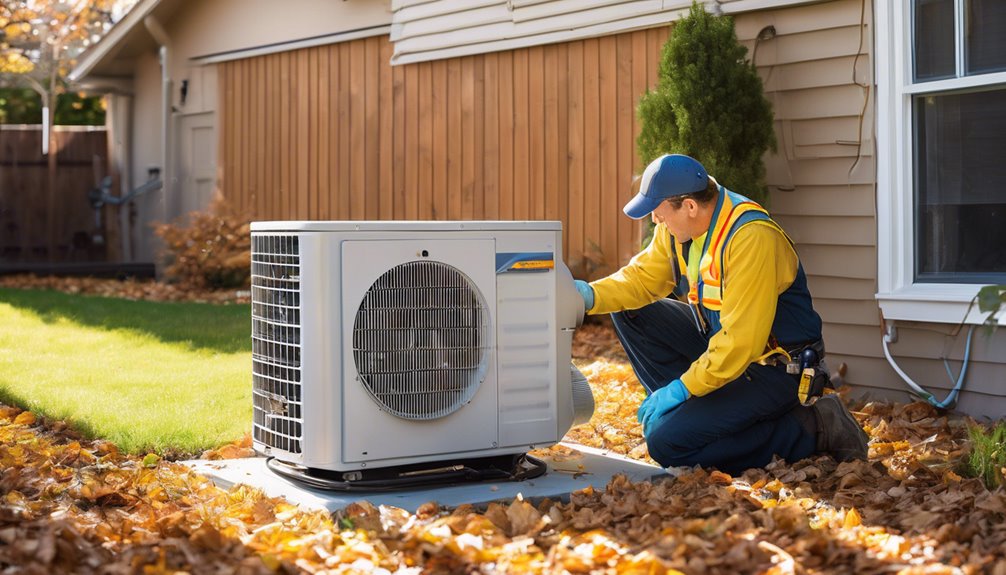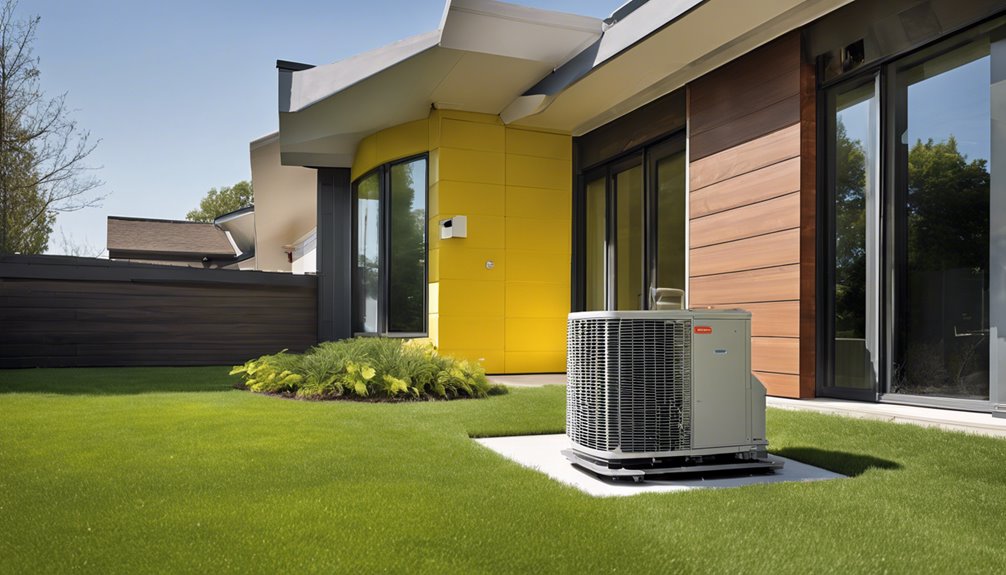To prevent AC coil freezing, you'll need to tackle common causes like design flaws, refrigerant leaks, and poor maintenance. Regularly clean your AC coils, ensure proper airflow around the unit, and maintain optimal refrigerant levels to keep your system running smoothly. Don't forget to inspect and replace air filters regularly, and schedule routine maintenance to catch any potential issues early on. By following these tips, you'll be well on your way to avoiding costly repairs and staying cool all summer long – and there's more to come on this topic.
Key Takeaways
- Identify and fix coil design flaws and refrigerant leaks to prevent coil freezing and ensure efficient AC operation.
- Clean AC coils regularly to remove debris and dirt that can restrict airflow and cause freezing.
- Ensure proper airflow around the AC unit by removing outdoor obstacles and maintaining a 3-5 foot clearance.
- Maintain optimal refrigerant levels through regular checks and top-offs to prevent coil freezing and system failures.
- Inspect and replace air filters regularly to ensure clean airflow and prevent coil freezing caused by dirty or clogged filters.
Understanding the Causes of Coil Freezing
When your air conditioner is running smoothly, it's easy to take its performance for granted, but once the coils freeze, you're faced with a costly and inconvenient problem.
You might wonder what's causing the issue. Coil design flaws can be a culprit, as they can restrict airflow and lead to freezing. Another common cause is refrigerant leaks, which can reduce the pressure in your system and cause the coils to freeze.
If you're not addressing these underlying issues, you'll continue to experience problems. It's essential to identify and fix these flaws to prevent coil freezing. By understanding the causes, you can take proactive steps to ensure your AC runs efficiently and effectively.
Cleaning Your AC Coils Regularly
You'll want to clean your AC coils regularly to prevent freezing, and there are a few methods to do so effectively.
You'll need to remove debris that's accumulated on the coils, and then take steps to prevent it from building up again in the future.
Coil Cleaning Methods
Cleaning your AC coils regularly is essential to prevent freezing and ensure your air conditioner operates efficiently.
You'll need the right tools for the job. Invest in a coil brush, which is specifically designed to remove dirt and debris from the coils. Use it to gently sweep away any loose particles.
Next, grab a foam sprayer, which is perfect for tackling tough grime buildup. Spray the foam onto the coils, letting it sit for a few minutes to allow the formula to penetrate.
Then, use a garden hose to rinse the coils clean. By following these coil cleaning methods, you'll be able to breathe easy knowing your AC is running smoothly and efficiently.
Removing Debris Effectively
To ensure your AC coils remain debris-free, make it a habit to inspect them regularly, ideally during the off-season or before the peak summer months. During inspection, look for signs of debris accumulation, such as dirt, dust, or leaves. Remove any visible debris using a soft-bristled brush or a garden hose with low pressure.
| Debris Removal Methods | Effectiveness |
|---|---|
| Soft-bristled brush | Gentle cleaning, effective for loose debris |
| Garden hose with low pressure | Effective for removing stuck debris, gentle on coils |
| Compressed air | Effective for tight spaces, gentle on coils |
| Coil cleaning brush | Effective for heavy buildup, gentle on coils |
| High-pressure washer | Not recommended, may damage coils |
Remember to clean your AC coils gently to avoid damaging them.
Preventing Future Buildup
Regular maintenance is key to preventing future buildup on your AC coils.
You'll want to clean your coils regularly to ensure they continue to function efficiently. Make it a habit to inspect and clean your coils every 1-2 months, depending on usage.
Check for any signs of moisture accumulation and ensure proper moisture management. Also, inspect the coil insulation for any damage or wear.
By doing so, you'll prevent debris and dirt from accumulating, which can lead to freezing. A clean coil is essential for optimal airflow and heat transfer.
Ensuring Proper Airflow Around the Unit
Proper airflow around your air conditioning unit is crucial to preventing coil freezing.
To ensure this, you'll need to remove any outdoor obstacles that might be blocking the air intake or exhaust vents. Check your unit's surroundings and clear any debris, vegetation, or obstructions that could be restricting airflow.
A clear area of at least 3-5 feet around the unit is recommended. By maintaining clear surroundings, you'll allow your AC to breathe easily and operate efficiently.
Maintain a 3-5 foot clearance around your AC unit to ensure easy airflow and efficient operation.
This, in turn, will help prevent coil freezing and keep your unit running smoothly. Remember, proper airflow is key to keeping your AC coils frost-free.
Maintaining Optimal Refrigerant Levels
One crucial aspect of preventing coil freezing is ensuring your air conditioner has the right amount of refrigerant. Refrigerant checks are essential to maintain optimal levels, as low levels can cause the AC coils to freeze. You should schedule regular checks with a professional to inspect the system and detect any leaks.
| Refrigerant Checks | Frequency |
|---|---|
| Initial Check | After Installation |
| Follow-up Check | Every 6-12 months |
| Leak Detection | Annually or bi-annually |
| System Inspection | Every 2-3 years |
| Refrigerant Top-off | As needed |
Don't wait until your AC coil freezes; perform regular refrigerant checks to prevent this issue. A professional can detect leaks and top off the refrigerant as needed, ensuring your AC runs efficiently and effectively.
Inspecting and Replacing Air Filters
Your air conditioner's performance is heavily reliant on clean air filters, which can significantly impact the AC coils' ability to function properly.
Dirty or clogged filters can reduce airflow, causing the coils to freeze. It's essential to inspect your air filters regularly to ensure they're clean and functioning correctly.
Clogged filters reduce airflow, causing coils to freeze, making regular inspections crucial for optimal AC performance.
- You're breathing in dirty air, which can aggravate respiratory issues
- Your energy bills are skyrocketing due to reduced airflow
- Your AC system is working harder, leading to premature wear and tear
Choose high-quality filters that are designed for your specific AC unit, and make sure to replace them according to the manufacturer's instructions.
Proper filter placement is also crucial, so ensure they're installed correctly to allow for optimal airflow.
Scheduling Regular AC Maintenance
By keeping your air filters clean, you've taken a significant step in preventing AC coil freezing. However, that's not all you can do to ensure your AC system runs smoothly.
Scheduling regular AC maintenance is crucial in preventing coil freezing and other issues. It's essential to have a trusted technician perform summer checks on your AC unit to identify and fix potential problems before they become major issues.
By doing so, you'll build technician trust and avoid costly repairs down the line. Regular maintenance also helps improve your AC's efficiency, reducing energy bills and prolonging its lifespan.
Don't wait until it's too late – schedule your AC maintenance today and enjoy a cool, stress-free summer.
Frequently Asked Questions
Can I Use a Hair Dryer to Thaw a Frozen AC Coil?
You're wondering if a hair dryer can thaw a frozen AC coil in an emergency. While it might seem like a quick fix, using a hair dryer for emergency thawing isn't recommended; instead, focus on regular coil maintenance to prevent freezing in the first place.
Will a Frozen Coil Cause My AC to Use More Energy?
You're wondering if a frozen coil will increase your AC's energy consumption. Yes, it will! A frozen coil reduces coil efficiency, making your AC work harder and use more energy to cool your space, which means higher bills for you.
Can I Clean My AC Coils With a Garden Hose?
You're wondering if you can clean your AC coils with a garden hose. While it's tempting, avoid using high hose pressure, which can damage the coil fins. Instead, use a gentle spray to loosen dirt, then let it air dry.
Will a Frozen Coil Cause Water Damage in My Home?
You're right to worry about water damage – a frozen coil can lead to ice formation, which can cause water seepage into your home, resulting in costly repairs and potential mold growth if not addressed promptly.
Can I Prevent Coil Freezing With a Thermostat Adjustment?
You're wondering if a simple thermostat tweak can save your AC coil from freezing. Adjusting the temperature can help, but it's not the only factor – you'll also want to monitor temperature fluctuations and humidity levels to keep your coil ice-free.
Conclusion
You've taken the right steps to prevent your AC coil from freezing. By understanding the causes, cleaning your coils, ensuring proper airflow, maintaining optimal refrigerant levels, inspecting and replacing air filters, and scheduling regular maintenance, you'll be able to enjoy cool air all summer long. Remember, a well-maintained AC unit is an efficient and effective one. Stay on top of these tasks and you'll reduce the risk of coil freezing, saving yourself from costly repairs and inconvenient breakdowns.



